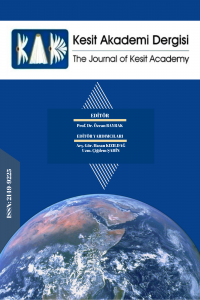GELİR MUTLULUK GETİRİR Mİ? ÜLKELERİN GELİR VE MUTLULUK DÜZEYLERİ ARASINDAKİ İLİŞKİYE YÖNELİK BİR DEĞERLENDİRME
Ülkeler arasındaki refah farkını oluşturan temel nedenlerden biri gelir farklılıklarıdır. Yapılan birçok araştırmada bir ülkenin gelir seviyesi arttıkça daha yüksek bir refaha ve kalkınmışlığa eriştiği görülmektedir. Bu durumun toplumdaki yansıması ise bireylerin yaşam memnuniyetlerinin artması kendini gösterir. Ancak bireylerin yaşam memnuniyetlerinin, dolayısı ile mutluluklarının artış gösterebilmesi için tek başına gelir seviyesinin artması yeterli değildir. Ekonomik kalkınmanın gerçekleşebilmesi için gelir artışının yanı sıra sosyal, kültürel, politik alanlarda da iyileşmenin gerçekleştirilmesi gerekir. Ancak anaakım neoklasik iktisatta, daha çok ekonomik büyümenin özetle gelir artışının önemi üzerinde durulmaktadır. Bu noktada amacın mutluluk artışı mı yoksa tek başına gelir artışını mı gerçekleştirebilmek olduğu bir yaklaşım sorunu olarak da karşımıza çıkmaktadır. Bu çalışmanın amacı temel olarak dünya ülkelerinin gelir seviyesi ile ülke vatandaşlarının mutluluk düzeyleri arasındaki ilişkiyi açıklayabilmektir. Bu amaç doğrultusunda İnsani Gelişim Endeksi, Dünya Mutluluk Raporu ve Gayri Safi Milli Mutluluk Endeksi Çerçevesinde konu ele alınmıştır. Çalışmada görülmüştür ki genel olarak gelir seviyesi yüksek olan ülkelerin refah ve mutluluk seviyeleri de daha yüksektir, ancak bu örneğe uymayan ülkeler de mevcuttur.
Anahtar Kelimeler:
Gelir, Ekonomik Büyüme, Mutluluk, Davranışsal İktisat
DOES INCOME BRING HAPPINESS? AN EVALUATION OF RELATIONS BETWEEN INCOME AND HAPPINESS LEVELS OF COUNTRIES
One of the main reasons for the welfare difference between countries is income differences. In many studies, it is seen that as an income level of an country increases, it reaches a higher level of refinement and development. This is the reflection of the society, the individual's life satisfaction increases. However, it is not enough to increase the level of income alone so that individuals' happiness of life, and therefore happiness, can increase. In order for economic development to take place, improvements must be made in social, cultural and political spheres as well as income growth. However, in the mainstream neoclassical economics, the economic growth is, in summary, largely emphasized on the importance of the income increase. At this point, there is also a challenge as an approach problem where the aim is to increase happiness or increase income alone. The purpose of this study is mainly to explain the relationship between the level of income of the world countries and the happiness levels of the citizens of the country. For this purpose, the subject was covered in the Human Development Index, the World Happiness Report and the Gross National Happiness Index. It is seen in the study that countries with generally high income levels have higher welfare and happiness levels, but countries that do not follow this example also exist.
Keywords:
Income, Economic Growth, Happiness, Behavioral Economics,
___
- Carbonell A.F (2005) “Income and well-being: an empirical analysis of the comparison income effect” Journal of Public Economics 89 (2005) 997 – 1019.
- Clark, A. E. , Frijters P., ve Shields M.A. Relative Income, Happiness, and Utility: An Explana- tion for the Easterlin Paradox and Other Puzzles, Journal of Economic Literature, 2008.
- Costanza R., Hart M., Posner S. Talberth J. (2009) “Beyond GDP: The Need for New Measures of
- Progress” Pardee Papers, Boston University Press. Coşkun, S. ve Tireli, M. (2008), Avrupa Birliğinde Yoksullukla Mücadele Stratejileri ve Tür- kiye, Nobel, Ankara.
- Easterlin, R. (1974) Does Economic Growth Improve the Human Lot? Some Empirical Eviden- ce” In: David, R. and Reder, R., Eds., Nations and Households in Economic Growth: Es- says in Honor of Moses Abramovitz, Academic Press, New York.
- Frey, B.S.&Stutzer A. (2002) “What Can Economists Learn from Happiness Research?” Journal of Economic Literature, Vol. 40, No. 2. (Jun., 2002), pp. 402-435.
- Güler M.Dönmez A. (2011) “İyi Olma Hali Bağlamında Uyum Düzeyi Kuramı ve Hedonik
- Döngü” Türk Psikoloji Yazıları, Haziran 2011, 14 (27), 38-45
- Han E. & Kaya A.A. (2013) “Kalkınma Ekonomisi Teori ve Politika” 8. Baskı Nobel Akademik Yayıncılık Ankara.
- Kahneman D. & Deaton A.(2010) “High income improves evaluation of life but not emotional well-being” PNAS | September 21, 2010 | vol. 107 | no. 38 | 16489-16493
- Kahneman D. (2003) “Maps of Bounded Rationality: Psychology for Behavioral Economics”
- The American Economic Review, Vol. 93, No. 5 (Dec., 2003), pp. 1449-1475.
- Lyubomirsky, S. (2008). Nasil mutlu olunur? (Gülfer Göze, Trans.). Istanbul, Turkey: Kapital
- Medya Hizmetleri A. S Mankiw, G. (2010). “Makroekonomi” Efil Yayınları, Ankara.
- New Economıc Foundatıon (2016). The Happy Planet Index. http://happyplanetindex.org/
- Schurer S. And Yong J. (2016) “HAPPINESS, INCOME AND HETEROGENEITY” The Singapo- re Economic Review, Vol. 61, No. 03, 1640017
- TÜİK, (2018) http://www.tuik.gov.tr/HbGetirHTML.do?id=27826
- Ura, K., Alkıre, S., Zangmo, t. Ve Wangdı, K. (2015). Provisional Findings of 2015 Gross Natio- nal Happiness Survey. Centre for Bhutan Studies & GNH Research
- Ünsal E. (2009) “Makroiktisat” İmaj Yayınları Ankara
- Veenhoven, R. ve Dumludağ, D. (2015). Iktisat ve Mutluluk: Bugün Daha Mutlu muyuz?. Chap- ter 11 in: Dumladağ, D., Gökdemir, O., Neyse, L. & Ruben, E. (Ed.), İktisatta Davranış- sal Yaklaşımlar (Behavioral Approaches In Economics), Imge Kitabevi, Ankara Turkey, 230.
- Yıldırım K. (2008). Makro Ekonomi, Ed. Kemal Yıldırım, 9. Baskı, Ankara, Seçkin Yayıncılık
- Başlangıç: 2015
- Yayıncı: Asos Eğitim Bilişim Danışmanlık San. Tic. Ltd. Şti.
Sayıdaki Diğer Makaleler
Eylül KABAKÇI GÜNAY, Oğuzhan ATA
KURUMSAL İTİBARIN, GÖREV PERFORMANSI VE ÖRGÜTSEL BAĞLILIĞA ETKİSİ: ÜNİVERSİTELERDE BİR UYGULAMA
Fatma TATLI KALAYCI, Kurtuluş DEMİRKOL, Serhat ERAT
HOCA ALİ RIZA’NIN RESİMLERİNDE İSTANBUL
Şanser VURGUN, Güliz Müge AKPINAR
ÇINAR AĞACI VE BEYAZ MELEK FİLMLERİNDE TÜRK TOPLUMUNUN HUZUREVİ ALGISI
TÜRKİYE AÇISINDAN DOĞRUDAN YABANCI SERMAYE YATIRIMLARININ GELİŞİMİNİN DEĞERLENDİRİLMESİ
SOKAK SANATI, GRAFFİTİ TEKNİĞİ VE MODA ALANINDAKİ UYGULAMALARI
Çiğdem TAŞTEPE, Seher Akdeniz ŞAHİN
BİR ANI YAZARI OLARAK İPEK ONGUN AS A MEMOIR WRITER IPEK ONGUN
